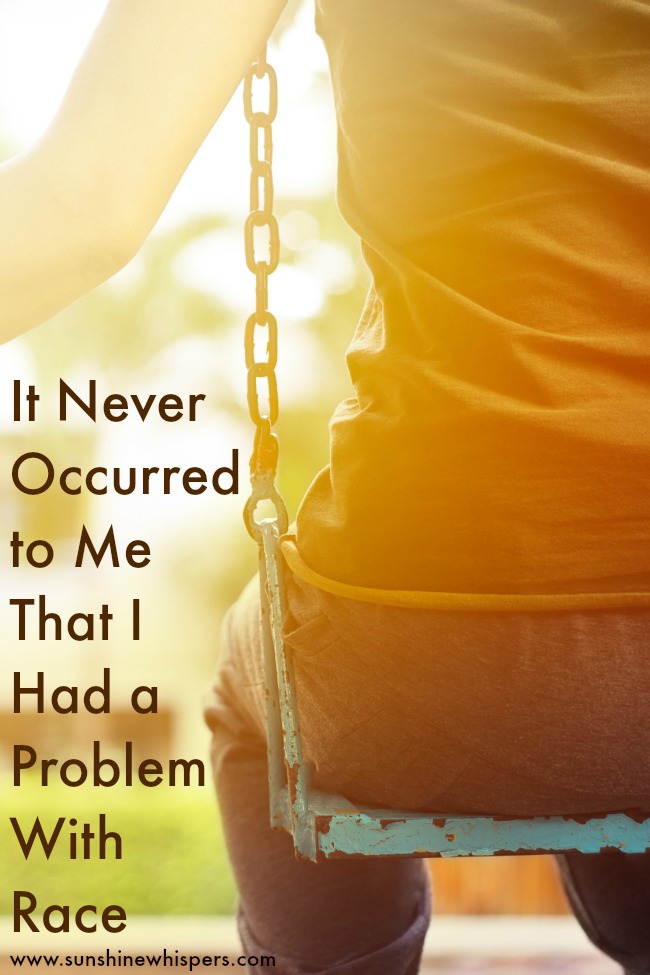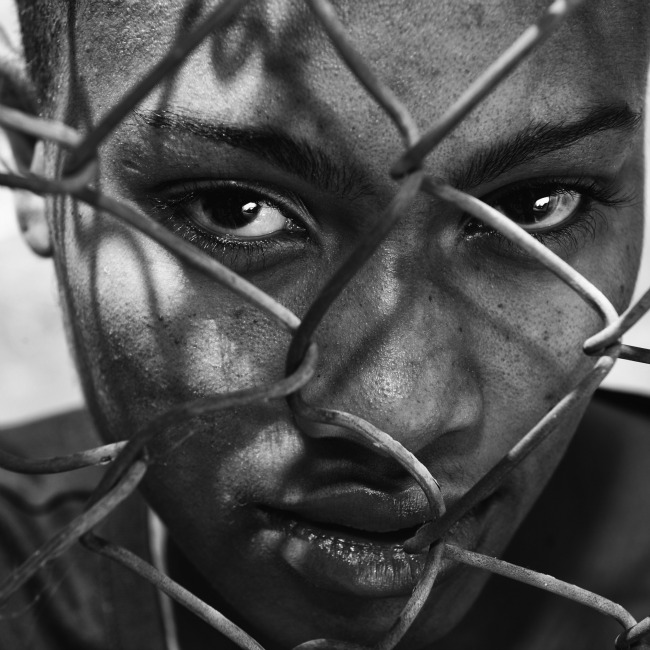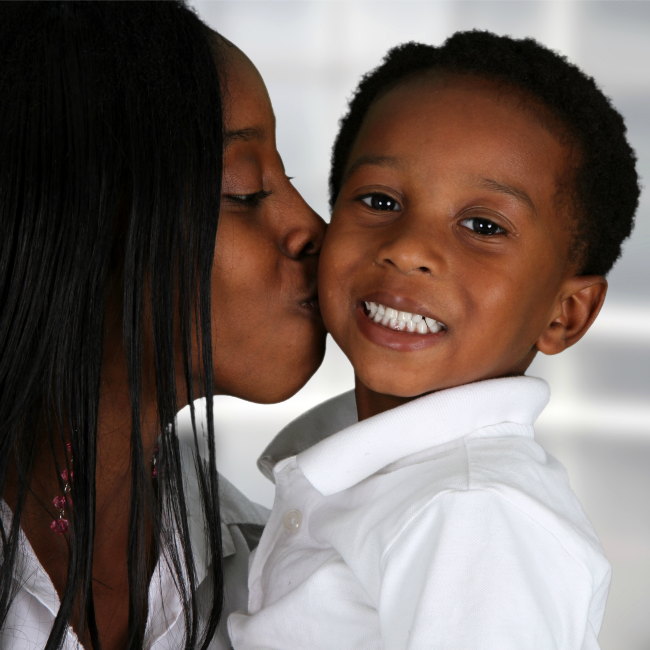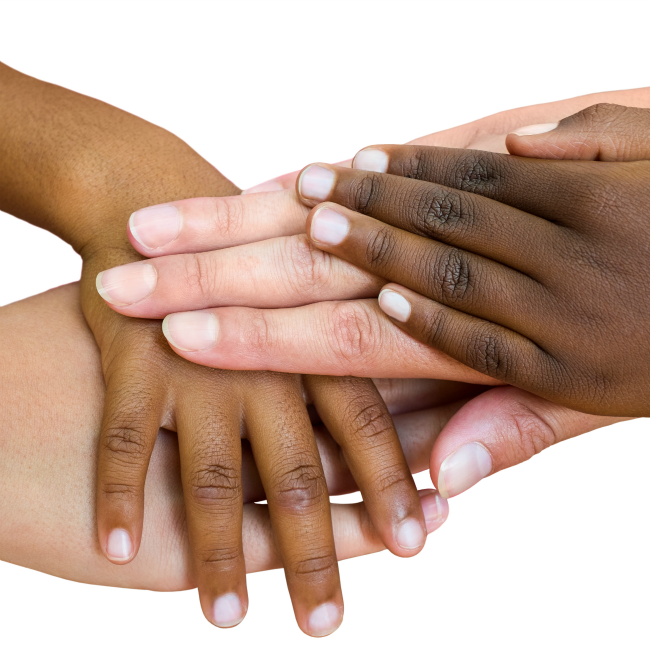It Never Occurred to Me That I Had a Problem With Race
It never occurred to me that I had a problem with race.
Growing up, I lived in what I thought was a very diverse and forward thinking area. Albany, NY is very ethnically diverse. People are proud of their heritage– Irish, Italian, Polish… all Catholic of course. There is a large Jewish population in the area as well, and in the 80’s you were just as likely to see a Hindu temple as you were any evangelical church.
I was not aware of any racial tension in my school, church, or neighborhood. I was taught that it was wrong to be prejudiced, to discriminate, or to ignore or harass someone based on the color of their skin.

A Problem With Race
As a matter of fact, the first time I encountered racial tension was when I went to college in Texas and encountered the Hispanic-American culture for the first time. My college roommate was incredibly racist… against Hispanic-Americans. I just didn’t get it. Up until that point, I hadn’t even realized that Hispanic-Americans were racially any different than Caucasians.
I was culturally naïve.
To be fair though, I think many Americans were naïve about race at that time. America in the early-90’s (pre-internet) was still very regionalized, at least in many parts of the country. So, if you lived in an area like this, it was really difficult to encounter people that were drastically different than yourself.
As a New York native, the racial tension prevalent in the southern United States was jarring to me. I didn’t participate in or condone it. But I didn’t confront it either. I compartmentalized it as a dysfunction of the South and rationalized that since I never planned to live permanently in the South, it was not my problem to deal with.
After college, I joined the U.S. Army– which is just about the most diverse environment in existence. For 9 years I worked and lived alongside people of every racial, religious, and socio-economic demographic. We didn’t merely exchange greetings at the soda machine either. We communed in close proximity, suffered sleepless nights, ate together, celebrated together, endured much hardship together. It is nearly impossible to ‘have a problem with race’ when you are so closely linked to such a diverse group of people. Granted, there were (and are) people that tried really hard to be ignorant. However, I found it easy to pat myself on the back for my open and inclusive racial attitudes.
It never occurred to me that I had a problem with race.
A few years ago, once I had moved to Maryland, my husband and I were at a dinner party with a couple of doctors who worked in inner city Baltimore. The one doctor, a woman, started talking about race and economic inequality in a way I had never heard of before. See, I grew up with the mindset that if you worked hard.. sometimes really hard, you could rise above your circumstances and pretty much accomplish anything you set your mind to.
I actually believed that was the way the world worked for everybody.

This doctor, who worked with AIDS patients in inner city Baltimore, pricked my conscience that day by confronting this mindset. I clearly remember her stating that for many of her patients, there was literally no hope for them. She wasn’t saying that my accomplishments didn’t matter because I was just a rich white girl. What she was saying was that for many people in inner city conditions, the mountain is too high to climb out of poverty. There is no access to decent education. There is no access to decent medical coverage. There isn’t even access to fresh fruit in the corner market. So, the vicious cycle of poverty repeats itself as another generation of young women escape through pregnancy, and another generation of young men (and women) escape through violence.
This hard truth has been reinforced again and again over the past few years as I hear stories, mostly from friends who work with troubled youth, about how horrible the conditions in the inner city are, and how hopeless the lives of those trapped in poverty are.
I didn’t understand the concept of white privilege though until this past year. (click here for a great illustration of what this means)
I know it isn’t convenient for a (relatively) affluent, white, Christian girl to admit that there is merit to the argument of white privilege. However, my heart has been pricked… and I think it has been pricked by God.
You see, the institutional poverty discussed above is not impacting many Caucasians. But it is impacting minorities with an alarming dis-proportionality.
And then there is the intersection of institutionalized poverty and law enforcement. (for more information on institutionalized poverty, click here)
I know that there are no easy answers for the seemingly lopsided nature of police brutality. However, I have been blessed with enough good sense to know that there is a correlation between the institutional poverty of the inner city and the ‘institutional discrimination’ of a system in which people are actually targeted more harshly in part due to the color of their skin.
It never occurred to me that I had a problem with race.
As a Christian, how should I respond?
Do I ignore it like I did in college and blame the problem on someone else?
Do I continue to try and share my life with a diverse group of people and congratulate myself on my cultural sensitivity?
Do I give money or even time to causes that help lift people out of poverty?
Well, that is a start.. but I feel like maybe it isn’t enough.
As a Christian.. and especially as a Christian who worships in a congregation that is very racially diverse, I am almost certain that it isn’t enough.

I mean, I don’t have to worry that my husband will get pulled over for a routine traffic stop and end up with his face pushed into the concrete… or worse. That is not a burden I will ever have to bear.
I am not overly concerned that my daughter will be withheld opportunity, admittance, or any other privilege because of her rosy cheeks and cute button nose. The doors of opportunity will likely be wide open to her.
How can I embrace my African-American brothers and sisters in Christ on Sunday, but casually gloss over the news of another 12-year old boy being killed by a police officer on Monday? Regardless of the circumstances surrounding the shooting, that little boy was someone’s baby!
As I fellowship and worship with my Christian Mom friends who are black, there are times when I can practically see the fear in their eyes. There is no reason to believe their sons or their husbands should ever have to face brutality from the police… but the threat is ever present all the same.
As a Christian, how can I even comprehend the horrors of a Bible study being targeted for massacre, not because the participants were exercising their 1st amendment rights, but because the participants were black? I have never heard of an all-white church being targeted like this. I haven’t heard of it because, to the best of my knowledge, it hasn’t happened.
It never occurred to me that I had a problem with race.. but the thing is, I do. And you do too.
We all do.
Do I know how to fix it? No. I don’t. Clearly, this is a complex, institutionally rooted, problem.
However, I for one, would really love to have a conversation with folks I worship with– with my fellow Christians. I want them to know that I love them.. that there isn’t a them. There isn’t a separation. There is only an ‘us.’
But mostly I want to listen to what they have to say. I want to hear their voice. I want to know how they would tackle racism in the church (because seriously, it does exist). I would love to hear ideas for how we can fight institutional poverty together in a productive and loving way.
And maybe we can all lay our preconceived notions about the way we think the world operates at the foot of the cross. Perhaps we can pray together for guidance so that we can bring the power of the Gospel, the power of Christ, to those who are not equipped to seek it out on their own. As ambassadors of Christ, we can show those without hope, that there is hope in Christ.
They may not be able to rise above their circumstances, but they can still be complete in Christ.
We will likely not be able to adequately challenge the institutional mindset that favors one group over another, but if we love each other as Christ loved us, it can bring us closer together.

If we strive to love one another as Christ loved us, even though earthly bonds fail, that bond of Christian love will be the perfect bond of unity in Christ… and in Christ alone.
I know I have a problem with race.. but this isn’t the end of the story. Let’s open a new chapter and work together for a better tomorrow.
Thank you for reading,
Sara




I appreciate your willingness to share so transparently. My eyes were first truly opened to racism and privilege in college, and it has been on my radar ever since. It’s such a polarizing issue, and I see so much hatred on both sides. What causes racism? Sin. What’s the cure for racism? The gospel. The cause and the cure are the same for racism of all kinds – racism toward minorities, as well as racism toward the privileged. May the whole Body of Christ rejoice in its multi-colored reflection of heaven-worship, embracing each other as the only race we truly are: a chosen race. (I Peter 2:9). Thank you for sharing with us at Grace & Truth!
I agree that it is such a polarizing issue.. and particularly among Christians.. it just makes me very sad. I agree.. a chosen race, a royal priesthood. It definitely helps keep our focus on Jesus and the Gospel message when we consider ourselves more as citizens of heaven than anything else. Thank you for your comment!
Thank you for sharing your thoughts and experiences. Such an important topic and discussion to have. I have two 10 year old sons, one is Black and one is white. Even living in the same town, going to same schools and having the cover of our white privilege, my son experiences daily reminders that he not quite equal to his brother. It’s subtle but it has its effect on a child. I would have never thought that to be true until I lived it with him.
Oh Jenni, thank you so much for sharing this perspective. That reminds me of the sociology experiments where two men with the same exact resume, height, weight, build, haircut, even clothes, apply for a job and then the gap between interview success is measured based on the race of the applicant. I just pray we can close the gap. ‘sigh’
What a powerfully thoughtful post. Thank you for sharing your truth and opening the door for dialogue.
Thank you Nae– I am very hopeful that the doors to dialogue will stay open. Thank you for your comment!
It’s funny – I grew up in San Antonio, Texas – where as a Caucasian, I was a minority. That being said, the high school I attended was 80%+ white. I too never truly experienced racism until I went to college in the Midwest, where much of the population is very homogeneous – made more so by my attending a Catholic university.
I don’t know what the solution is beyond how I teach and talk to my own family about it – but I do think the responsibility sits on all of us – no matter our race – to want more for our children and ourselves, no matter the circumstances you are born into.
That is really interesting that you experienced racism for the first time in the Midwest, and I experienced it for the first time in Texas. That is really interesting.
Yeah, I don’t know what the solution is either.. but I agree that the responsibility absolutely sits on all of us. Thank you for your comments!
As I read your post, my heart thumped a lot faster. Was that the ‘pricking’ you were talking about? Assuredly. This post hits at a very tender spot – almost hurtful. I have some thinking and praying to do.
I have a lot of thinking and praying to do too. Thank you for reading and responding. 🙂